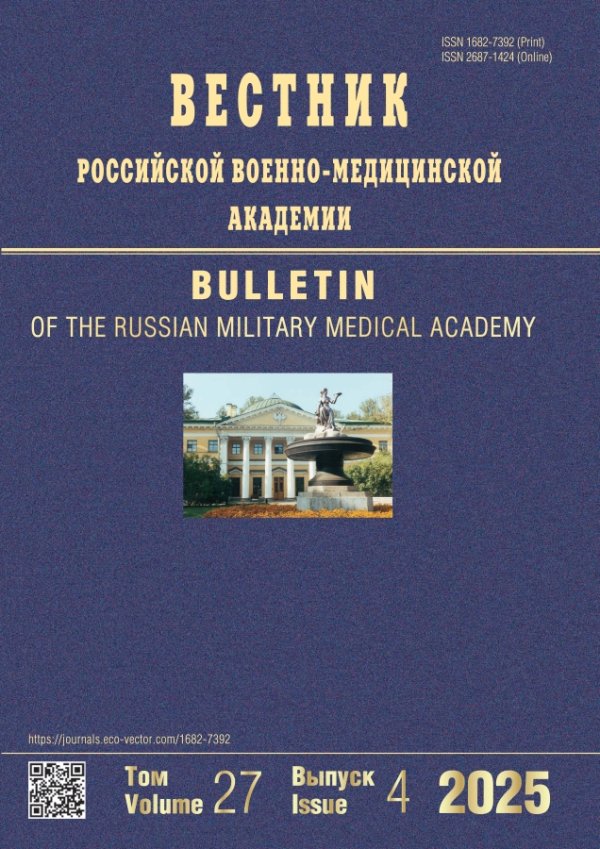Meningococcal infection: clinical and epidemiological characteristics in modern conditions
- Authors: Sharabkhanov VV1, Zhdanov KV1, Zakharenko SM1, L’vov NI1, Kozlov KV1, Lyashenko Y.I1, Ivanov KS1, Bulankov Y.I1, Yaremenko MV1
-
Affiliations:
- Военно-медицинская академия им. С.М. Кирова
- Issue: Vol 20, No 4 (2018)
- Pages: 186-191
- Section: Articles
- URL: https://journals.rcsi.science/1682-7392/article/view/12356
- DOI: https://doi.org/10.17816/brmma12356
- ID: 12356
Cite item
Full Text
Abstract
Full Text
##article.viewOnOriginalSite##About the authors
V V Sharabkhanov
Военно-медицинская академия им. С.М. Кирова
Email: vmeda-nio@mil.ru
Санкт-Петербург
K V Zhdanov
Военно-медицинская академия им. С.М. Кирова
Email: vmeda-nio@mil.ru
Санкт-Петербург
S M Zakharenko
Военно-медицинская академия им. С.М. Кирова
Email: vmeda-nio@mil.ru
Санкт-Петербург
N I L’vov
Военно-медицинская академия им. С.М. Кирова
Email: vmeda-nio@mil.ru
Санкт-Петербург
K V Kozlov
Военно-медицинская академия им. С.М. Кирова
Email: vmeda-nio@mil.ru
Санкт-Петербург
Yu I Lyashenko
Военно-медицинская академия им. С.М. Кирова
Email: vmeda-nio@mil.ru
Санкт-Петербург
K S Ivanov
Военно-медицинская академия им. С.М. Кирова
Email: vmeda-nio@mil.ru
Санкт-Петербург
Yu I Bulankov
Военно-медицинская академия им. С.М. Кирова
Email: vmeda-nio@mil.ru
Санкт-Петербург
M V Yaremenko
Военно-медицинская академия им. С.М. Кирова
Email: vmeda-nio@mil.ru
Санкт-Петербург
References
- Жданов, К.В. Менингококковая инфекция: ранняя клиническая диагностика и неотложная помощь / К.В. Жданов // Воен-мед журн. - № 1. - Т. 336. - С. 29-35.
- Королева, И.С. Менингококковая инфекция в Российской Федерации / И.С. Королева [и др.] // Эпидемиология и гигиена. - 2015. - № 6, т. 1. - С. 27-28.
- Королева, И.С. Менингококковая инфекция и бактериальные гнойные менингиты в Российской Федерации: десятилетнее эпидемиологическое наблюдение / И.С. Королева, Г.В. Бело- шицкий, М.А. Королева // Эпидемиология и инфекционные болезни. Актуальные вопросы. - 2013. - № 2. - С. 15-20
- Костюкова, Н.Н. Менингококковая инфекция в России: про- шлое и ближайшие перспективы / Н.Н. Костюкова, В.А. Бехало, Т.Ф. Чернышова // Эпидемиология и инфекционные болезни. Актуальные вопросы. - № 2. - 2014. - С. 73-79.
- Менингококковая инфекция: Методические указания. - СПб: ВМА, 2010. - 160 с.
- О состоянии санитарно-эпидемиологического благополучия населения в Российской Федерации в 2017 году: Государ- ственный доклад. - М.: Федеральная служба по надзору в сфере защиты прав потребителей и благополучия человека, 2018. - 268 с. 190 4 (64) - 2018 ВЕСТНИК РОССИЙСКОЙ ВОЕННО-МЕДИЦИНСКОЙ АКАДЕМИИ Обзоры
- Платонов, А.Е. Эпидемиология менингококковой инфекции в России и мире на современном этапе / А.Е. Платонов, И.С. Королева, К.О. Миронов // Вакцинация. - 2004. - № 1.- С. 6-7.
- Сафади, M.A. Эпидемиология и профилактика менингококко- вой инфекции: критическая оценка политики вакцинации / M.A. Сафади, Г. Макинтош // Педиатрическая фармакология. - 2012. - № 1. - С. 45-64.
- Руководство по инфекционным болезням: в 2 кн. - Кн. 1 / под. ред. Ю.В. Лобзина, К.В. Жданова. - 4-е изд., доп. и перераб. - СПб.: Фолиант, 2011. С. 518-536.
- Ali, A. Global practices of meningococcal vaccine use and impact on invasive disease / A. Ali, Z. J. Rabab, N. Messonnier // Pathog Glob Health. - 2014. - Vol. 108, № 1. - P. 11-20.
- Lingappa, J.R. Serogroup W-135 meningococcal disease dur- ing the Hajj, 2000 / J.R. Lingappa [et al.] // Emerging Infection Disease. - 2003. - Vol. 9, № 6. - Р. 665-671.
- Harrison, L.H. Glob-al epidemiology of meningococcal disease / L.H. Harrison, C.L. Trotter, M.E. Ramsay // Vaccine. - 2009. - № 24. - Р. 51-63.
Supplementary files







